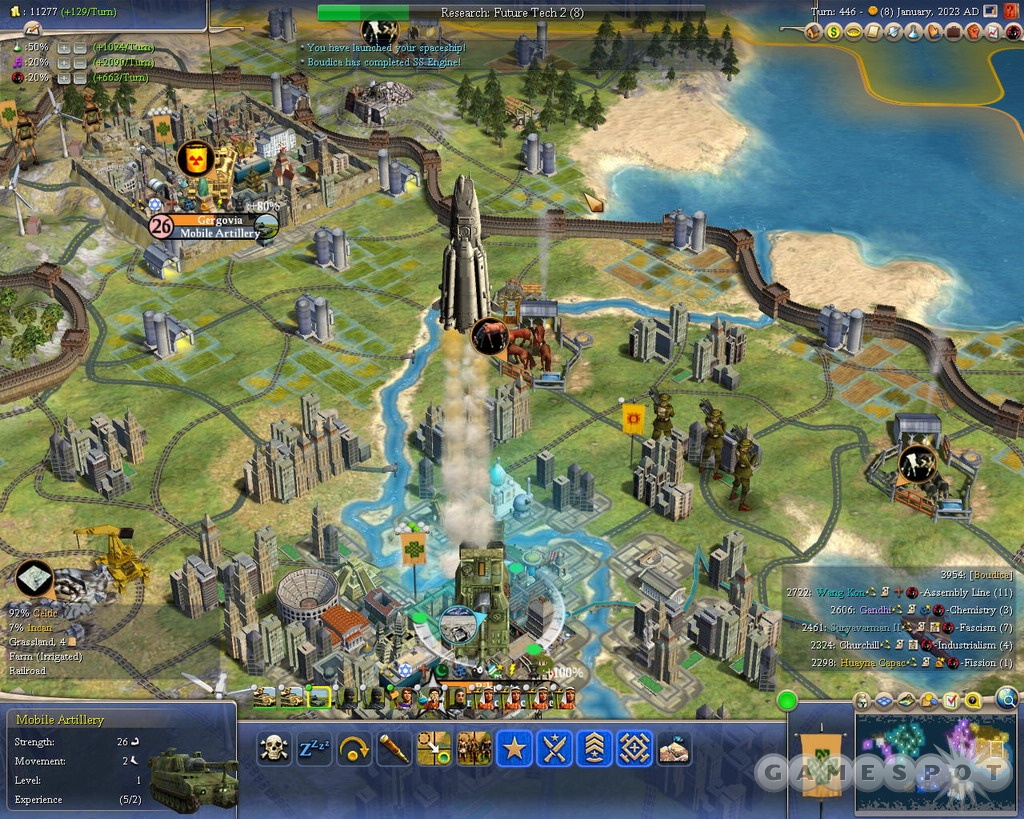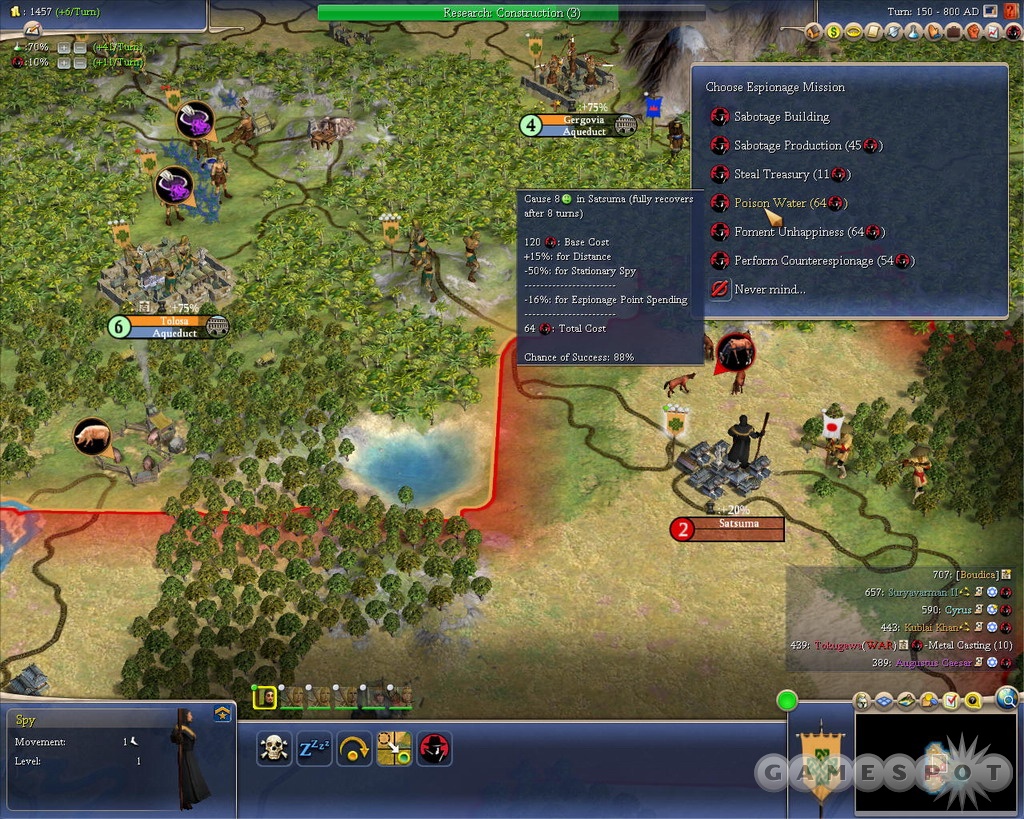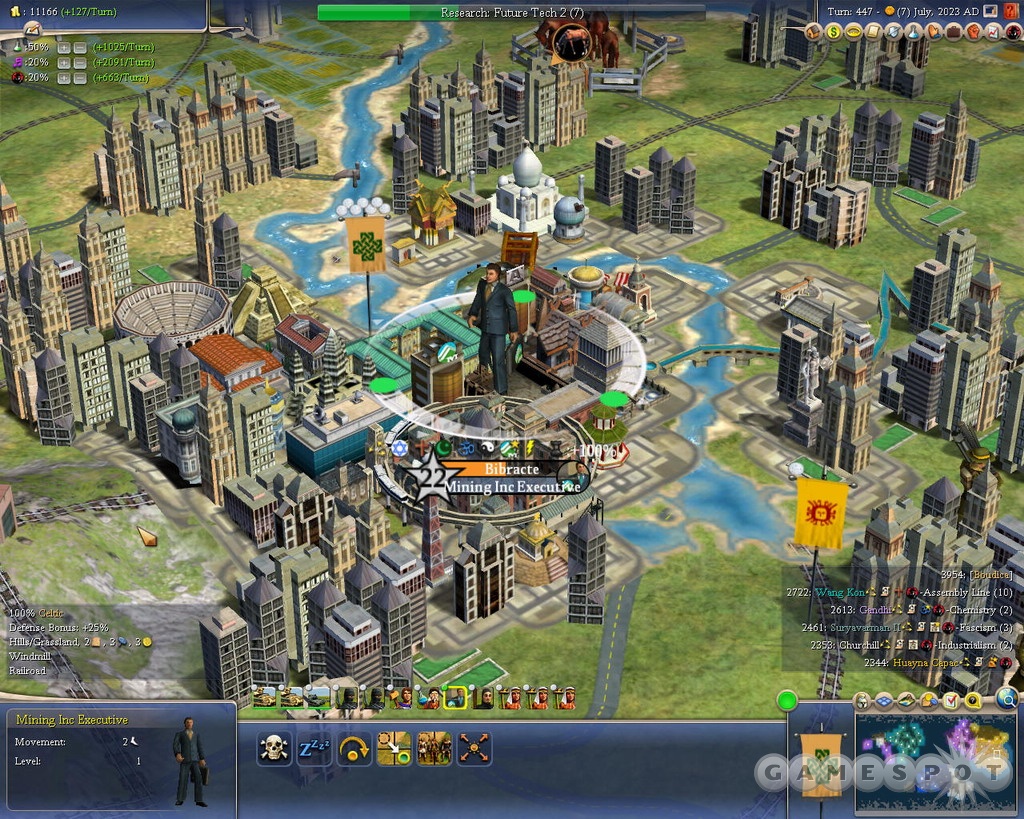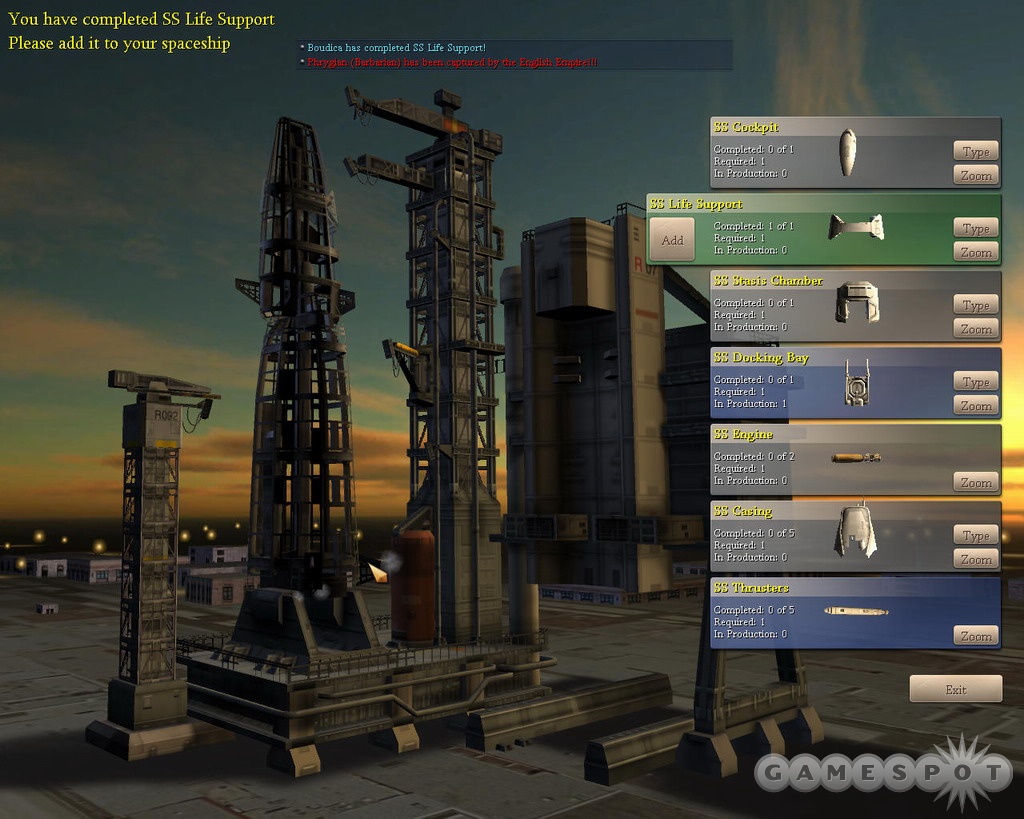Civilization IV: Beyond the Sword Hands-On - Espionage, Corporations, and More
We take a look at some of the major new gameplay additions in the second expansion pack for the epic turn-based strategy game.
Civilization has always been a game about big ideas. After all, the iconic turn-based strategy series is all about letting you write history your own way. You begin the game in the Stone Age with a single, primitive civilization. Then you begin the long struggle to survive and thrive throughout history. Along the way, you encounter rival civs and deal with them diplomatically or militarily, though you can get wiped out by rampaging barbarians or an overly hostile neighbor. That's been the formula throughout the course of the series, though 2005's Civilization IV eliminated a lot of the tedious micromanagement that had built up over the years. In 2006, Publisher 2K Games and developer Firaxis released the Warlords expansion, which added a number of historical scenarios and civilizations. Now the companies are working on Beyond the Sword, the second expansion--a big expansion that's about double the size of Warlords. Not only does it add 11 new scenarios and mods (drastic reworkings of the core game), as well as 10 new civilizations, but it also adds significant changes to the Stone-Age-to-Space-Age epic game.
If you're the kind of Civilization fan who likes playing historical scenarios, then Beyond the Sword will offer plenty of contemporary and near-future conflicts for you. WWII: Road to War lets you wage the great struggle in either Europe or the Pacific as either the Axis or the Allies. Next War, which is set in the middle of the 21st century, has you control clone armies and mechanized units. Broken Star features a modern-day Russian civil war. The scenarios and mods aren't just historical either. There are a couple of incredibly fanciful mods that transform Civ IV into the most unexpected things. First, there's Afterworld, a turn-based tactical scenario that looks like a cross between X-Com and Diablo, which is almost the last thing that you might expect a Civ mod to look like. Then there's Final Frontier, a sci-fi scenario where you must explore and settle star systems while trying to find the way home to Earth.

Fans of Civ IV's epic game are also in for some significant changes. Basically, there are whole new layers added to the game that bulk up espionage, diplomacy, and the space race to settle Alpha Centauri, the neighboring star closest to Earth. At first, all this added complexity seems at odds with Civ IV's design philosophy, which was to ditch a lot of the technical clutter to make the game easier to play and more accessible. However, many of these changes affect the latter half of the epic game, which felt a bit rushed in Civ IV. With the changes in Beyond the Sword, the latter half of the epic game is given a lot more importance.
First, there are dozens of changes and new units in the expansion, but we'll focus on the key ones. Some of the minor ones include new culture-specific graphics for many early-age units, so that an Asian swordsman doesn't look like a European one. There are a slew of new units, such as the paratrooper who can drop on any square. Air warfare has gotten an overhaul because aerial units can now receive unit promotions, and cities can only hold a handful of air units, though they can add more if they have airports. The new fort system also serves as an airfield for air units, as well as a canal system to help link two bodies of water. The artificial intelligence has been improved across the board, while the computer is a lot better and more focused, particularly in warfare. And so on.
One of the major changes involves moving espionage and spying from the late game to the early game. In Civ IV, you could only build spies after the Scotland Yard wonder was built, which happened so late in the game that spies were all but useless. That's changed now, and espionage becomes available as soon as you research the alphabet technology. You can then build spy units, which are invisible to everyone but you. On the other hand, you cannot see enemy spy units in your territory, but we'll get to how you counter them in a moment. You need to station spies in enemy cities so you can conduct espionage missions, which include sabotaging production, fomenting revolt, stealing technology, poisoning the water supply, and more. However, the more complicated the espionage mission, the more espionage points it costs. You generate espionage points by allocating a certain percentage of your economy to them, just like you allocate research and culture spending. These espionage points are spread evenly amongst all foreign nations that you're in contact with, but you can go into the new espionage screen and redirect points. So if you're at war with Russia, you can focus all your espionage points on the Russians.

When you attempt a mission, the game checks your espionage point total against the total that the nation you're targeting has against you. If you have more points focused at them than they do at you, the cost of the mission is reduced proportionally. However, if you have fewer points than the enemy, the mission becomes that much more expensive. There are also a number of ways that you can defend yourself against spies. You can station one of your spies in a city, and that raises the cost for anyone who wants to conduct espionage missions there. Also, certain buildings make a spy's job more difficult, such as courthouses, jails, and castles. By giving these existing structures new functionality, Firaxis has made them a lot more valuable. There's also a new security bureau structure that really makes things difficult for hostile spies.
The new corporation system is also a tricky new system. Corporations work like religion in that if you are the first to create a corporation, you can send out agents to spread the corporation to other cities. Indeed, the effects of religion taper off about halfway through the epic game, so corporation serves as a replacement of sorts. To create a corporation, you need access to its prerequisite resources. For example, Sid Sushi Co. is one of the seven corporations in the game (its name is a play on Civilization creator Sid Meier's name). To establish Sid Sushi's headquarters, you must research the corporation and medicine technologies, as well as have access to crab, clam, fish, or rice resources. More importantly, Sid Sushi can only be built by a great-merchant unit, and each corporation requires a specific great-person unit.
Corporate Drones
Once you create a corporation, you can create corporate executives and spread the company to other cities. There, the corporation can generate gold or extra production in that city, but there's also a price. Each corporation sucks up gold and resources in each city, so the effects can balance each other out. However, the key is to not spread your corporations in your territory but in someone else's lands. That way, you get to reap the profits while someone else's city pays the costs. If that sounds unfair, you can protect yourself by switching your government to communism, thus eliminating all private property or use of the mercantilism civic, which nullifies the effect of foreign corporations. 
Random events are another major new feature in Beyond the Sword...sort of. That's because random events were in the original Civilization, released way back in 1991, but they disappeared in subsequent games. They're back in Beyond the Sword, and they're exactly like they sound. For instance, if you play with random events (they can be toggled off if you don't like surprises), all sorts of things--both good and bad--can happen to you. An earthquake could destroy a building in one of your cities, or a fire could burn down a forest square. On the flip side, another civilization could suddenly donate food to help keep a city of yours from starving, or a breakthrough could give a bonus to your military units.
What's really interesting about random events is how they've evolved. There are more than 150 random events, and some can offer questlike goals, while others can offer multiple resolutions. For example, an early random event might challenge you to become the first civilization to construct libraries in seven cities. If you do so, you'll be given a reward. Or another random event will give you a choice as how to respond. For instance, you might capture a fugitive fleeing from another country. You can return him to his country to face justice, which can earn you bonus points with that country, but it might upset another country. Or you can interrogate the fugitive for information about his country; thus, boosting your espionage point total against that country but also risking that country's wrath. Random events feel like a solid addition because they inject a sense of chance into the game.
Finally, there's the new and improved space race, which is similar to the one featured in Civilization II. The reason for the change was that the space race in Civilization IV felt a bit anticlimactic. If you started the space race first, then odds were that you were going to launch first and automatically win the game. Now, you can be the second or third civilization to start the space race but still have a chance to win. Or you might not even participate in the space race. That's because you can now launch your spaceship once you have the minimal amount of components in place, such as rockets, an engine, and the parts that make up the capsule. Or, if you spend more turns and resources, you can build a bigger spaceship that can get to Alpha Centauri faster. Or, if another civilization looks like it's going to get to Alpha Centauri first, you can try to invade and take over its capital city, which will doom the spaceship as it loses its guidance from ground control. This adds a lot more chance and decision-making to the space-race process, as well as a way to come back from behind.

Beyond the Sword adds so many core changes that you could almost call it Civilization V, but the changes feel like they're a step in the right direction. Perhaps that's because a lot of the changes can really shake up the established approaches to playing the game. There's a lot more to chance now, and you can't predict when a natural disaster or another random event might throw a new complication into the mix. Beyond the Sword is quite possibly the biggest Civilization expansion to date, and that's saying a lot. But you have time to prepare because it won't ship until July.
Got a news tip or want to contact us directly? Email news@gamespot.com
Join the conversation